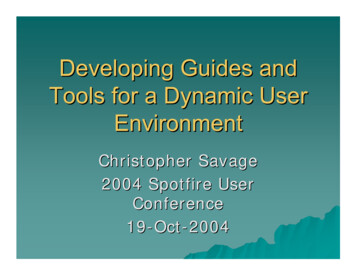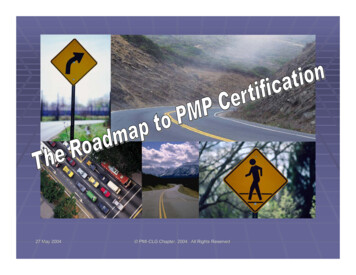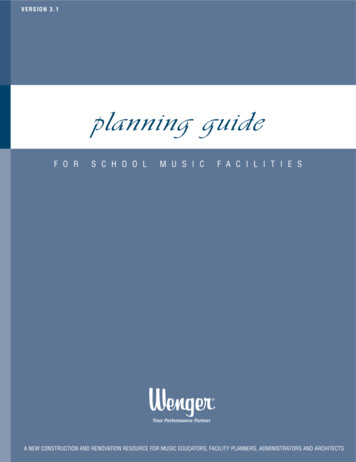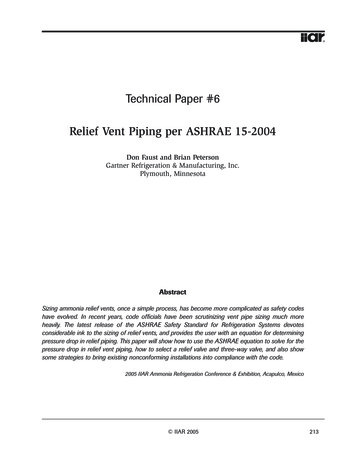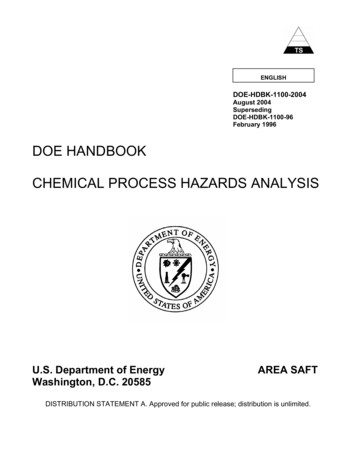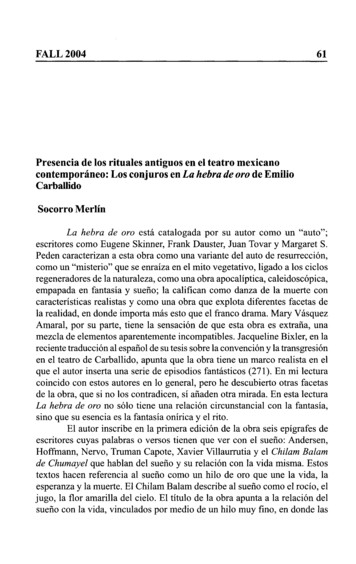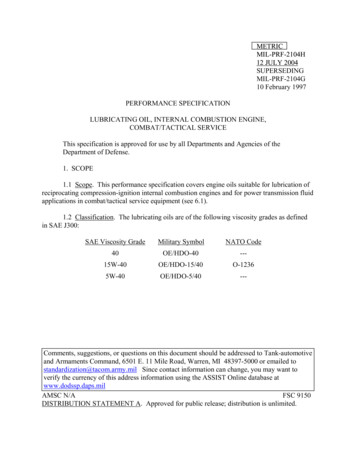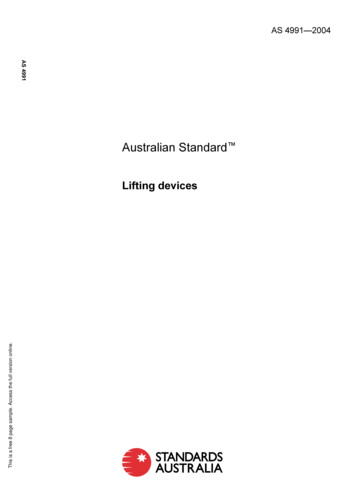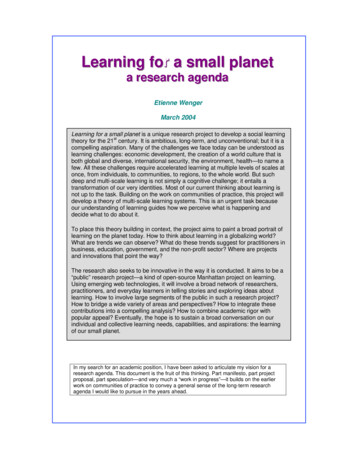
Transcription
Learning for a small planetaa rreesseeaarrcchh aaggeennddaaEtienne WengerMarch 2004Learning for a small planet is a unique research project to develop a social learningtheory for the 21st century. It is ambitious, long-term, and unconventional; but it is acompelling aspiration. Many of the challenges we face today can be understood aslearning challenges: economic development, the creation of a world culture that isboth global and diverse, international security, the environment, health—to name afew. All these challenges require accelerated learning at multiple levels of scales atonce, from individuals, to communities, to regions, to the whole world. But suchdeep and multi-scale learning is not simply a cognitive challenge; it entails atransformation of our very identities. Most of our current thinking about learning isnot up to the task. Building on the work on communities of practice, this project willdevelop a theory of multi-scale learning systems. This is an urgent task becauseour understanding of learning guides how we perceive what is happening anddecide what to do about it.To place this theory building in context, the project aims to paint a broad portrait oflearning on the planet today. How to think about learning in a globalizing world?What are trends we can observe? What do these trends suggest for practitioners inbusiness, education, government, and the non-profit sector? Where are projectsand innovations that point the way?The research also seeks to be innovative in the way it is conducted. It aims to be a“public” research project—a kind of open-source Manhattan project on learning.Using emerging web technologies, it will involve a broad network of researchers,practitioners, and everyday learners in telling stories and exploring ideas aboutlearning. How to involve large segments of the public in such a research project?How to bridge a wide variety of areas and perspectives? How to integrate thesecontributions into a compelling analysis? How to combine academic rigor withpopular appeal? Eventually, the hope is to sustain a broad conversation on ourindividual and collective learning needs, capabilities, and aspirations: the learningof our small planet.In my search for an academic position, I have been asked to articulate my vision for aresearch agenda. This document is the fruit of this thinking. Part manifesto, part projectproposal, part speculation—and very much a “work in progress”—it builds on the earlierwork on communities of practice to convey a general sense of the long-term researchagenda I would like to pursue in the years ahead.
LLeeaarrnniinngg ffoorr aa ssmmaallll ppllaanneettaa rreesseeaarrcchh aaggeennddaaExecutive summaryWe live in unusual times. The world is rapidly growing smaller, interdependent, andunpredictable. We are facing daunting challenges—the establishment of a global yetdiverse society, a fragile environment, economic imbalances, and regional conflicts toname a few. These challenges are neither simply local nor abstractly global. Theyrequire accelerated learning at various levels of scale at once, from individuals, tocommunities, to organizations, to regions, to worldwide learning systems. Understandinghow to enhance our learning capabilities in this multi-dimensional nexus is takingincreasing urgency. This proposal outlines a broad research agenda to produce a sociallearning theory for our times.A theoretical discourse is not an abstraction. It is a set of conceptual tools that enable usto see, think, and act in new ways. The learning theory to be developed in this project isintended to inform not only research, but also the work of practitioners in a variety offields and sectors, for instance: Executives in the private and public sectors who need to figure out how toenhance the learning capability of organizations Educators who reflect on the role of education in a learning society, on thelearning needs of their students, and on the relationships of their institutions tobroader social learning systems Government officials who struggle to rethink their role as conveners of learningsystems that include multiple government levels, private industry, and citizengroups (e.g., terrorism preparedness, health, education) Policy-makers and non-governmental activists who need to understand thelearning implications of their positions Community leaders and social workers who need to consider the identities aslearners that enable citizens to participate in societyTo this end, the proposed agenda places theory building in the context of a broaderresearch framework. The project consists of five components:1. Theory. This project furthers the convergence of learning theory and social theorystarted with the work on communities of practice. Building on this earlier work, itfocuses on large-scale social learning systems involving complex constellations ofcommunities of practice individual identity, constructed as a learning trajectory through these complexsystemsI argue that these two elements provide the foundation for a robust social theory oflearning. Each one is, I claim, a useful perspective for looking at learning in today’scomplex and globalizing society. But the two are inextricably linked and consideringlearning in one inevitably leads the other. Together, they provide a framework fortheorizing learning capability.Research agenda v1.1i
2. Trends. Building on the theory, the project will hypothesize and document a numberof trends in learning. This proposal describes four examples of such trends, forinstance, an observation that learning seems increasingly organized as a horizontalprocess of mutual negotiation, as opposed to the more traditional view of a verticalrelationship between a producer and a recipient of knowledge. The ultimate goal is tocombine a set of broad trends like this one into an emerging and dynamic portrait oflearning in the world today.3. Implications. Combining the trends and the theory should produce interestingpractical implications, which the project will explore. In particular, the combinationcan be used to frame a rethinking of social institutions from the perspective of theircontribution to our overall learning capability. This proposal takes an initial look atsuch institutions as organizations in the private and public sectors, where knowledge strategies entailan integration of identity-based communities with hierarchical structures civil society, where learning calls for increasingly complex community structures governance, where the role of convening a learning system broadens thetraditional notions of government and management education, where the theory helps reposition schooling and frame the principlesof an identity-oriented curriculum4. Cases. The empirical base of the project will be a systematic collection of stories andcase studies to make the theory, the trends, and the implications concrete. Casesmight include organizational initiatives, school experiments, interesting communities,large-scale learning systems, as well as biographical narratives of individual learningtrajectories. Through ongoing analysis of this growing corpus of cases, the projectwill look for patterns to confirm or reject hypotheses. These concrete examples alsohelp practitioners see how they can put the framework into practice.5. Methodology. The fifth element of the project is an ongoing process ofmethodological reflection necessary to ensure that there is a systematic rigor to thedevelopment of the framework and its application.The full proposal describes these five components in greater detail. All five componentswork together. The theory suggests trends and design implications. These in turnsuggest cases to study, which feed back into the theory, the trends, and the implications.The methodological component adds a reflexive learning loop to the process. Thisreflection also focuses on walking the talk and building a learning system around theproject. Not only are practitioners expected to benefit from the results of the research,they are welcome to contribute their own stories, requirements, and insights.This project is long-term, cross-sectoral, and interdisciplinary. Its scope is meant tospawn a multitude of related projects that invite the involvement of students, from shortcase studies to full dissertations. In addition, the project aspires to become the kernel ofa broad community of practitioners and researchers who I know are ready to becomeengaged in an agenda to further develop an intellectual foundation for their work.* * * * * * *I am now looking for an academic home for this research, as well as sources of fundingfor supporting student projects, workshops, conferences, the systematic management ofthe corpus of cases and stories, and writing for a variety of audiences. If your institutionor foundation is interested, I am ready to talk.Research agenda v1.1ii
LLeeaarrnniinngg ffoorr aa ssmmaallll ppllaanneettaa rreesseeaarrcchh aaggeennddaaTable of contentsIntroduction1Overall approach: five componentsA boundary-crossing research enterprise1. Social learning theory: the production of meaningfulness4Agency and structure in social learning systemsLarge-scale social learning systemsIdentityIdentity and learning systems: a dual perspective on learningStructural dimension of learning capabilityFunctional elements of learning capabilityA social theory of learning2. Learning trends: an emerging portrait19The “horizontalization” of learningThe “partialization” of learning imperativesThe “personalization” of value creationThe “individualization” of trajectories of identityTrends and patterns: an emerging gestalt3. Learning implications: action, design, and institutions25Organizations: institutionalizing learning imperativesCivil society: the social fabric of learningGovernance: emergence and stewardshipEducation: the management of trajectories of identityTheory in practice4. Learning stories: a corpus of cases35Purpose of the corpusElements of the corpusA nexus of research projects5. Learning in the future: reflection on methodologyA learning theory for a small planet3738BibliographyResearch agenda v1.1iii
LLeeaarrnniinngg ffoorr aa ssmmaallll ppllaanneettaa rreesseeaarrcchh aaggeennddaaIntroductionThe purpose of this research project is to develop a theoretical foundation to helpaddress the learning challenges of our globalizing world. The production of a theoreticaldiscourse is a consequential activity to the extent that it enables new ways of seeing,thinking, talking, and therefore acting. My sense is that the concept of community ofpractice has turned out to be surprisingly influential precisely because it produces such adiscourse: it enables people to give voice to something they already knew, but did notquite have the language to act upon. The discourse is important, but it is only a smallpart. It serves the enterprise of a community, which uses it for acting in the world andthus gives it its actualized meaning. It is the aspiration of the proposed research projectto help build an intellectual foundation for, but also with, a community of peopleconcerned with learning on our small planet.The scope of the project is broad. It looks at learning as a social process that does notknow national, sectoral, or disciplinary boundaries. The idea is that a learning theory forour times must be able to talk about the world itself as a global learning system in whichour individual learning takes place. It cannot be confined by the traditional divisionsamong education, business, government, non-profit, and civic domains. Nor can itassume that learning is confined to specific settings or moments in people’s lives.Learning is a property of social systems at various levels of scale. It is also the drivingforce of lifelong trajectories that we build in the context of these social systems.The horizon of the project is long-term. I plan to work on it for the rest of my career. It isalso long-term in its outlook: it considers the evolution of learning in society over a timeframe of a few decades. It does not take current systems as given, and short-termimprovements to these systems are not the driver of the work. The project seeks tocreate a vision of learning, of what is required, of what is possible. Such a long-termview does not exclude immediate relevance. I believe we need to act. But the projectplaces imperatives for action in the context of a long-range view of what a learningsociety needs. It uses this long-range view to inform opportunities for action or toreinterpret current developments and projects as to their long-term significance.Developing a discourse on learning for a shrinking planet is thus both unreasonablyambitious and reasonably humble. It has to be ambitious in its scope and horizon to dojustice to its topic. But it has to be humble in claiming only to provide the underlyingdiscourse—the thinking tools, not finished solutions or plans of action. A discourse, nomatter how interesting, is lame without a living community.At a time when the world seems as small as our challenges seem complex, ourunderstanding of learning needs to match the tasks at hand—whether we consider theenvironment, poverty, health, crime, terrorism, education, the politics of globalization or our very own place in all this. We need models to learn how to learn at multiple levelsof scale, from the personal to the planetary. Increasing our capacity to learn—individually and collectively—is taking on a special urgency if we see ourselves caught,as I believe we are, in a race between learning and self-destruction.Research agenda v1.11
Learning trendsunderstand emergingtrends for learning inthe world todayLearning implicationsexplore implications foraction, design, andinstitutionsLearning storiesbuild a diverse,cross-sectoral corpusof early examplesOngoing methodological reflectionLearning theorydevelop a socialtheory of learning as aconceptual frameworkFigure 1. Overall approachOvera
Building on this earlier work, it focuses on large-scale social learning systems involving complex constellations of communities of practice individual identity, constructed as a learning trajectory through these complex systems I argue that these two elements provide the foundation for a robust social theory of learning. Each one is, I claim, a useful perspective for looking at .
